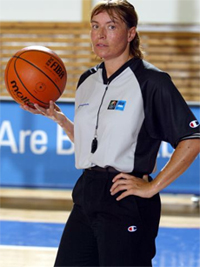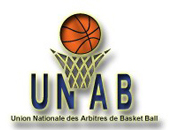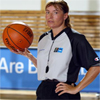
But who is Chantal Julien?
Born in Grenoble, she resides in Mandelieu in the Alpes-Maritimes where she works as a PE instructor at the Mandelieu Town Hall. She was a high-level player, having spent several years on the courts of the women’s league with Challes les Eaux, Chenôve, and then Tarbes, before joining Vence and ending her playing career at Mandelieu BC.
 She holds a BE2 certificate. She was the French champion of NF2 with Challes in 1986 and 1B with Tarbes in 1992. She won the French Cup in 1987 with Challes.
She holds a BE2 certificate. She was the French champion of NF2 with Challes in 1986 and 1B with Tarbes in 1992. She won the French Cup in 1987 with Challes.
She oriented towards refereeing while she was still playing in 1988. After going through national screening channels, she began in NM1 in 1994, then in Pro B in 1996 and Pro A the following year in 1997.
The same year, she became an International Referee. Her high-level refereeing career quickly took off. She officiated the European Junior Championship in Turkey in 98, then the Women’s Final Four in Brno (Slovakia) in 99. In 2000, the Under-20 Women’s European Championship in Slovakia, culminating in the final.
2001, the Women’s Asian Championship in Bangkok, with a final as a bonus. 2002, the European Junior and Under-20 Championships and the appointment to officiate the Women’s World Championship in China, where she had the honor of refereeing the final of this championship.
First of its kind for a female referee in FIBA. She then participated in the Asian Games in Korea in 2003 before receiving the supreme assignment to officiate the women’s final of the Olympic Games in Athens.
She is the first woman to be appointed by FIBA Europe to referee the last Men’s European Championship in Serbia.
Chantal Julien has, of course, refereed many finals of the French LNB championships and also 3 Pro B finals.
She is a member of the Board of the Côte d’Azur Basketball League and Head of Training at CRAMC Côte d’Azur since 2006.
To read Chantal’s diary, you just need to visit the website of the National Union of Basketball Referees.
She also supervises referee courses organized by FIBA World. Nice-Première interviewed Chantal Julien to better understand her passion for refereeing.
Nice-Première: We are more used to seeing athletes transition to coaching or consulting. You have “transitioned” to refereeing. How do you go from being a player to a referee, and how do you make that decision? Is it an epiphany you wake up to one morning?
Chantal Julien: It was actually while interacting with referees while playing that I realized there could be a good atmosphere and a certain conviviality (a bit like in a team). Becoming a referee allowed me to stay in the world of High-Level but from a different perspective. Training is also something I enjoy but it can wait. To referee, I must always be up to the mark physically and challenge myself personally. Moreover, having a High-Level playing background, I was told that I would have a lot of ease managing the game, especially on the technical level.
NP: How did Chantal Julien the basketball player behave with referees and how does referee Chantal Julien behave with athletes?
CJ: As a player, I was obnoxious and constantly contested. It was only after becoming a referee that I “calmed down a bit,” but didn’t stop completely. Knowing the rules well doesn’t help when a colleague on the field makes a mistake. You mention it, but in a more respectful tone.
My relationship with athletes is, I believe, very cool, too cool!!! It’s often what I’m criticized for when I’m evaluated. Not enough discipline towards some players. I try to talk with them rather than sanction them immediately. At first, I was playing more than refereeing.
NP: You referee men and with men. Is it always easy? What is your strategy to assert yourself?
CJ: Having a strong personality remains my essential key to assert myself. Either resist a verbally abusive player, face him, do not hesitate to sanction him. In any case, never show fear (and it happens to me sometimes in “hot” games). Always show confidence even if it’s not the case!
Refereeing with men is not always easy. Generally, my colleagues in France respect what I do a lot. There have been (and there still are 1 or 2) who do not accept being assistant referees behind me (when I’m the chief referee). And they try to let me know that on the field. In which case, I tell them and generally, I do not mince words.
It happened during the World Championship in Brazil.
NP: Let’s talk about the competition. How did the women’s world championships unfold in Brazil? Which teams and players impressed you?
CJ: The Championship went very well. In the first round, I couldn’t officiate any big matches (on paper) because France was quickly involved with rankings and qualification for the next round.
All matches that could influence France’s future opponent couldn’t be assigned to me for officiating.
Australia’s Lauren Jackson impresses me greatly, as do the USA with their WNBA stars, Brazil with its fantastic audience, and the Spanish player Valdemoro.
NP: Are you close to the tricolor players? Are you consulted by the staff?
CJ: The French team was in Barueri, about 45 kilometers by bus from Sao Paulo, where we were staying. So it was difficult to see them, especially as I often had games at the same time they did. I saw them on the first day against the Czechs because I was officiating right after the Russia/Nigeria match.
In any case, when you’re in a referee group, it’s better to remain as neutral as possible regarding your country, even if your heart is obviously there.
The staff doesn’t ask me anything. Anyways, with Alain Jardel, the dialogue is difficult.
NP: How do you overall evaluate the refereeing in this competition? By browsing through your diary, we can see that you referee with very inexperienced referees. How are you selected?
CJ: The refereeing is very heterogeneous due to the diversity of countries not used to officiating matches of this competition level at home. Some referees have never refereed with three referees. We had a clinic before starting the tournament, but it is not enough for some. They learn on the spot (hard to start during a World Championship!!!)
The evening before the match days, we receive our assignments for the next day. I am often with the inexperienced ones, to guide and train them on the field. The strength of a good referee is also being able to pass on their expertise to the less experienced.
NP: What’s the atmosphere like in Brazil?
CJ: Very good ambiance among us. Only the Eastern Europeans keep to themselves in their world, speaking Russian all day long, knowing we don’t understand a word of it.
The Canadian and American women are very fun-loving; the evenings weren’t dull.
NP: Tell us about a typical day for Chantal Julien during this world championship.
CJ: Breakfast, relax in my room, and prepare for my match. If it’s in the evening, I take a stroll around the hotel for lunch. Depending on the day’s matches, I watch a game (if a colleague I like is officiating, I go to support them), and prepare for mine. Or if it’s the other way around, I return to the hotel and wait for the others to go for dinner. It’s convenient because our hotel was located a 3-minute walk from the basketball arena.
The two rest days we had were organized by our two Brazilian referee colleagues. The first, on a beach about a 2-hour bus ride, very typical of Brazil. The second, a barbecue day, was about 15 minutes from the hotel.
NP: Lastly, did you have the opportunity to visit Brazil and Sao Paulo a bit? What struck you?
CJ: I acknowledge that we didn’t see much of Brazil.
Strolling alone here is not advised, so prudence was exercised, and we always stayed in a group.
On the last evening, a “SAMBA” night in a typical corner. Great atmosphere, at least we saw that!!!
NP: You are back in France. Do you regret not officiating in the final?
CJ: On September 20, I officiated the closest quarter-final of the day (Spain/Russia), with all the events that occurred (rain on the field, postponed match, obnoxious colleagues about being directed by a woman, …).
After that, there were two options: either officiate a semi-final or the final. In either case, receiving one of these two matches means being among the tournament’s best.
Receiving the match “Brazil/Australia,” the semi-final, the most beautiful match of the tournament, was MY final, and I am happy to have officiated this encounter (tight match, at stake, with a fantastic atmosphere worthy of Brazil’s image).
Moreover, I had already officiated the World Championship final in China four years ago, as well as the one at the Athens Olympic Games in 2004.
It is also nice to share the emotion that a final can evoke, for instance, the Canadian referee had never officiated one.


